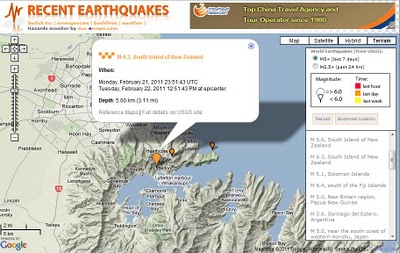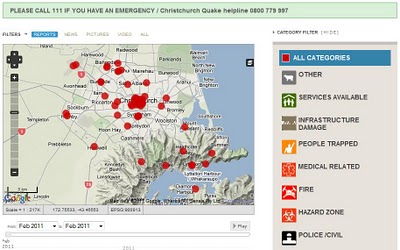Bohemian Grove is a 2700-acre campground located at 20601 Bohemian Avenue, in Monte Rio, California, United States, belonging to a private San Francisco-based men’s club known as the Bohemian Club. In July of each year, the Bohemian Grove hosts a three-week encampment of some of the most powerful men in the world.
Christchurch earthquake
No relief from natural disasters in this corner of the world. This time the tragedy has struck New Zealand town of Christchurch. A powerful and shallow earthquake of 6.3 in magnitude, with epicentre just about 10 km south from the town centre, has severely shaken the city knocking down many houses and office blocks. Current death toll stands at 65 but hundreds are reported missing. My heart goes out to all those affected, especially those who lost loved ones.
Spatial community in New Zealand has quickly mobilised and deployed Ushahidi platform to assist with dissemination of vital information from authorities as well as that reported by individuals in the affected areas: http://eq.org.nz/
Native Client: Getting ready for takeoff
Over the last few months we have been hard at work getting Native Client ready to support the new Pepper plug-in interface. Native Client is an open source technology that allows you to build web applications that seamlessly and safely execute native compiled code inside the browser. Today, we’ve reached an important milestone in our efforts to make Native Client modules as portable and secure as JavaScript, by making available a first release of the revamped Native Client SDK.
The SDK now includes support for a comprehensive set of Pepper interfaces for compute, audio, and 2D Native Client modules. These interfaces are close to being stable, with some important exceptions that are listed in the release notes.
In addition, we’ve focused on improving security. We have enabled auto-update and an outer sandbox. This allowed us to remove the expiration date and localhost security restrictions we had adopted in previous research-focused releases. Beyond security, we’ve also improved the mechanism for fetching Native Client modules based on the instruction set architecture of the target machine, so developers don’t need to worry about this any more.
We are excited to see Native Client progressively evolve into a developer-ready technology. In the coming months we will be adding APIs for 3D graphics, local file storage, WebSockets, peer-to-peer networking, and more. We’ll also be working on Dynamic Shared Objects (DSOs), a feature that will eventually allow us to provide Application Binary Interface (ABI) stability.
Until the ABI becomes stable, Native Client will remain off by default. However, given the progress we’ve made, you can now sticky-enable Native Client in Chrome 10+ through the about:flags dialog. Otherwise, you can continue using a command line flag to enable Native Client when you want to.
A big goal of this release is to enable developers to start building Native Client modules for Chrome applications. Please watch this blog for updates and use our discussion group for questions, feedback, and to engage with the Native Client community.

